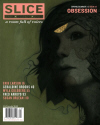Slice – Spring/Summer 2013
Co-publishers Celia Blue Johnson and Maria Gagliano of Slice magazine want to take a moment of your time to share with you their rabid obsession with literature: “This issue of Slice was designed to interfere with your day. We want you to miss your subway stop because you were too busy turning the pages.” This is no joke, dear reader. Obsession is the theme of this issue and every story, poem, and essay is dangerously addictive to read. Subjects range from the mundane to the insane and every piece of writing is sure to keep your attention as your train passes you by.
Co-publishers Celia Blue Johnson and Maria Gagliano of Slice magazine want to take a moment of your time to share with you their rabid obsession with literature: “This issue of Slice was designed to interfere with your day. We want you to miss your subway stop because you were too busy turning the pages.” This is no joke, dear reader. Obsession is the theme of this issue and every story, poem, and essay is dangerously addictive to read. Subjects range from the mundane to the insane and every piece of writing is sure to keep your attention as your train passes you by.
“Twelve Letters to my Assassin” by Steven Wingate is about a scientific genius who is obsessed with a childhood friend/rival who promised to kill him when they were young. The death threat emerged over the naming of a species of salamander the two boys found by a river. The rival wanted to name the amphibian after a girl he had a crush on. The narrator refused and thus began a lifelong obsession and bitter rivalry. The narrator’s letters start out arrogant and condescending to his would-be killer:
11 April 20xx
Dear Ass:
I have decided to shorten your name, because if you are going to kill me as you constantly threaten . . . I need to get a few digs in and remind you what a pathetic copycat you have always been. What a slave to my genius your own genius cannot resist being.
As the letters continue, our narrator changes his tone and realizes he is not as clever as he thinks. This story is absurdly funny, like a Saturday morning cartoon, but also has a tragic heart that speaks of loneliness and desperation.
Joshua Bodwell’s “What is Stolen Can Never be Returned” shows us a different kind of obsession featuring an old woman spying on her younger, rowdier neighbors. Her husband was a consummate seaman who had died years ago to cancer: “He drank as he loaded bait buckets and he drank as he pulled traps. He was at his best when he had some suds in him. It’s strange, I guess, that a drunk everyone assumed would drown at sea ended up wasting away on dry land with a case of cancer.” The woman directs her bitterness and frustration on a teenage girl she sees stealing a pack of beer from another neighbor’s truck. Driven by a misguided sense of justice, the woman calls the police to “nab that little thief, and teach her a goddamned lesson about messing with other people’s things.” I like how Bodwell makes you hate the old woman’s snooping, yet sympathize with her loneliness.
We Americans are obsessed with our sports. Baseball, football, and basketball are just a few of our national obsessions, but there is another national sport that doesn’t get as much attention: Spelling. David Ellis Dickerson talks about his lifelong obsession with spelling bees in his autobiographical essay “For the Love of Words.” Dickerson was a spelling guru by the time he reached kindergarten and was reading at a college level by the third grade. He entered his school’s spelling bee confident in victory:
I kicked ass. The words were pretty easy, and I knocked them aside with relief. Salient. Echoic. Transom. I even nailed mugwump. By the final round it was down to just me and a third grader, and the only reason the third grader was still around was that he’d gotten even easier words than I had. I mean, come on: swampland? How is that even a spelling word? And don’t get me started on February.
Dickerson’s struggle ends in tragedy when he misspells the final word due to the ill advice of one of his teachers. But his obsession with spelling does not die in the third grade. Dickerson continues to participate in spelling bees as an adult. He learns that winning is not important when it comes to spelling because in the end everyone is “simply thrilled to be around words, and I just bubbled over with the fun of it.”
My two favorite poems in this issue are Todd Colby’s “Let Us Know You’re Here” and “Scram.” Colby strings together a wonderful set of words to create fantastic images and moods, as in these first few lines to “Let Us Know You’re Here”:
I stuffed my silver spacesuit
full of cashews. I wanted to explain
about how when I’m out there, and physics,
and the food they give me, well, I’m rambling.
Rambling seems to be the connecting theme of these two poems. “Scram” is all questions related to memory and a longing to return to another time with an unnamed partner. Here are my favorite lines in the poem:
Do you remember when the crowds
would disperse along the river and wander
into the hills split not only by desire but the muted
nobility of earnestness and palimpsests?
For some reason, this sticks out to me because there is a sense of good friends breaking apart and going their separate ways. Perhaps you can find your own meaning in these poems.
Overall this is a great issue full of great writing. This issue can certainly suck you in and make you late to work, but, seriously, don’t miss your bus.
[www.slicemagazine.org]





